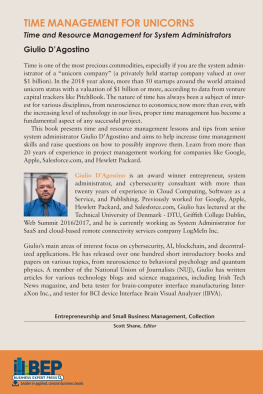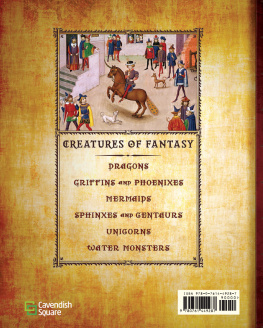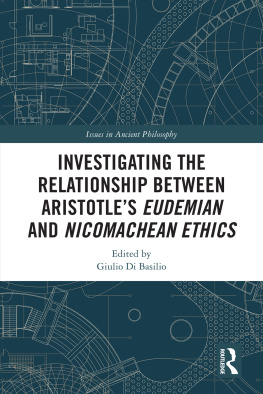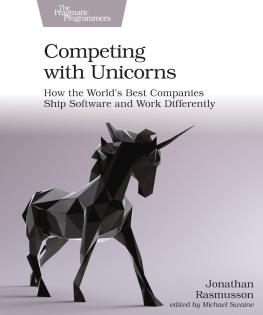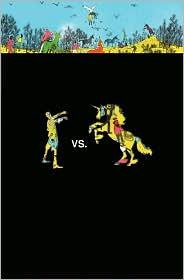Giulio DAgostino - Time Management for Unicorns
Here you can read online Giulio DAgostino - Time Management for Unicorns full text of the book (entire story) in english for free. Download pdf and epub, get meaning, cover and reviews about this ebook. publisher: Business Expert Press, genre: Religion. Description of the work, (preface) as well as reviews are available. Best literature library LitArk.com created for fans of good reading and offers a wide selection of genres:
Romance novel
Science fiction
Adventure
Detective
Science
History
Home and family
Prose
Art
Politics
Computer
Non-fiction
Religion
Business
Children
Humor
Choose a favorite category and find really read worthwhile books. Enjoy immersion in the world of imagination, feel the emotions of the characters or learn something new for yourself, make an fascinating discovery.
- Book:Time Management for Unicorns
- Author:
- Publisher:Business Expert Press
- Genre:
- Rating:5 / 5
- Favourites:Add to favourites
- Your mark:
- 100
- 1
- 2
- 3
- 4
- 5
Time Management for Unicorns: summary, description and annotation
We offer to read an annotation, description, summary or preface (depends on what the author of the book "Time Management for Unicorns" wrote himself). If you haven't found the necessary information about the book — write in the comments, we will try to find it.
Time Management for Unicorns — read online for free the complete book (whole text) full work
Below is the text of the book, divided by pages. System saving the place of the last page read, allows you to conveniently read the book "Time Management for Unicorns" online for free, without having to search again every time where you left off. Put a bookmark, and you can go to the page where you finished reading at any time.
Font size:
Interval:
Bookmark:

Time Management for Unicorns
Time Management for Unicorns
Time and Resource Management For System Administrators
Giulio DAgostino

Time Management for Unicorns:
Time and Resource Management For System Administrators
Copyright Business Expert Press, LLC, 2021.
All rights reserved. No part of this publication may be reproduced, stored in a retrieval system, or transmitted in any form or by any means electronic, mechanical, photocopy, recording, or any other except for brief quotations, not to exceed 250 words, without the prior permission of the publisher.
First published in 2021 by
Business Expert Press, LLC
222 East 46th Street, New York, NY 10017
www.businessexpertpress.com
ISBN-13: 978-1-95253-882-7 (paperback)
ISBN-13: 978-1-95253-883-4 (e-book)
Business Expert Press Entrepreneurship and Small Business Management Collection
Collection ISSN: 1946-5653 (print)
Collection ISSN: 1946-5661 (electronic)
Cover image licensed by Ingram Image, StockPhotoSecrets.com
Cover and interior design by S4Carlisle Publishing Services Private Ltd.,
Chennai, India
10 9 8 7 6 5 4 3 2 1
Dedicated to my family and my wife
Description
Time is one of the most precious commodities, especially if you're the system administrator of a unicorn company (a privately held startup company valued at over $1 billion). In the2018 year alone, more than 50 startups around the world attained unicorn status with a valuation of $1 billion or more, according to data from venture capital trackers like PitchBook. In this book you will find time and resource management lessons from senior system administrator Giulio D'Agostino; learn from more than 20 years experience in project management working for companies like Google, Apple, Salesforce.com and Hewlett Packard.
Keywords
time management; agile; project management; perception; behavioral psychology; salesforce; system administration; entrepreneurship; privacy; blockchain; privacy; startup; technology
Contents
Everything we experience, every thought, impression, intention, is part of a moment in time. The world is present to us in a series of moments, like frames in a movie or the pages in this book. We seem to have no choice about this. We experience the moment we inhabit now. Time feels completely unlike space: We cant jump ahead, go back, or go forward. Time is not experienced like space, where we have a choice where to move. The difference between how we experience time and space shapes the whole of our existence.
Jorge Luis Borges and Arthur Schopenhauer once said that life and dreams are pages from the same book; to read them in order is to live, but to browse among them is to dream.
Videos, music, and books are examples of how we experience time. By reading this book, you are a creature living in time.
Consciousness exists because of the story of the self, and the dimension of time is indispensable for the awareness of the self. We know that our brains experience time through the senses and by doing so create the illusion of time over and over again, helped by memory and imagination.
To know how we perceive time and how we experience time, it is crucial to have a brief journey to the history of calendars. Everyone uses calendars to keep tabs on significant dates and occasions; calendars would be equal to maps for direction in space. Dates on a calendar are the coordinates of our travel through time.
The cycle of day and night regulated the lives of our ancestors. The story of the calendar begins with the Moon, the Sun, and the Earth, with astronomy. The cycle of the seasons was known to astronomers as the tropical year, and it could be measured accurately. The stages of the Moon measure the lunar month: New Moon, First Quarter, Full Moon, Last Month, and New Moon again. It is 29.5305888531 days long, but becoming longer by a little less than a 50th of a second per century.
You will find 12.36826639275 lunar months in a tropical year. The history of this calendar principally concerns the attempts of astronomers and mathematicians to force the tropical year and the lunar month to stick into a plot composed just of whole numbers. Most new calendars, such as those of Greece, were based upon 2 months; yet, to keep the calendar in step with the seasons, it has been necessary to insert more months now and then since 12 lunar months are 10.8751234326 days short of a tropical year. Each of those Greek city-states kept its calendar; however, along with the insertion of the months has been abandoned to the public government. Callippus, a century later, made 940 lunar months equal to 76 years, all 365 days. Hipparchus, the astronomy father, suggested a different cycle that made 304 years very similar to 3760 lunar months and 111035 days. The Metonic cycle again became prominent in the ancient Christian Church, which attached the date of Easter to the phases of the Moon. Nonetheless, it is significant that although the Greeks made immeasurable contributions, their calendar isnt one of them.
The culture of Egypt left to posterity a few of the wonders of the world. The pyramids and the sphinx of Giza, the Valley of the Kings, and Tutankhamuns enigmatic tomb still confuse us. The pharaohs search for immortality, show us Egyptians unique view of time, and search for immortality. The ancient Egyptians also bequeathed the idea thats at the center of our calendar. Contrary to the Babylonians, the Greeks, and the early Romans, they based their calendar upon the Sun. As the oldest high-farming culture, Egypt was dependent upon the yearly flood of the Nile, which brought water and fertile silt to the rivers floodplain. Life in Egypt was ruled by the seasons, and hence by Sunlight. The Moon played no part in the calendar. The Egyptians had 12 months, all 30 days, plus an extra 5 days at the close of the year. These 5 days were given over to celebrations and were correlated with the birthdays of the best gods of the Egyptian pantheon. The year was 365 days. They accepted the seasons would become later and later to the calendar, in a cycle that would take to finish. The Egyptians assessed the relation of their calendar to the straight year, not by observing Siriuss heliacal rising. Usually, Sirius rising was the ruler that defined Siriuss first sighting every year in the morning sky before sunrise.
Until the time of Julius Caesar, the calendar was the sole calendar in which each month and day was defined by external rules instead of being determined by priests discretion or by the astronomers observations.
The calendar of ancient Rome was mainly a lunar calendar with an extra, or intercalary, month occasionally inserted to maintain the weeks more or less in step with the seasons. You will find 12 months, and they were termed as follows: Januarius, Februarius, Martius, Aprilis, Maia, Junius, Quintilis, Sextilis, September, October, November, and December. In over 2500 decades, these titles have come down to us almost unchanged, apart from Quintilis and Sextilis. The Romans were quite superstitious. They considered odd numbers as blessed and even numbers as unlucky. So all months except February had an odd number of days: March, May, Quintilis, and October 31; February 28; and the remainder 29. This gave 355 days, approximately equivalent to 12 lunar months. When required, at the end of February, and on occasions, February itself was shortened to 23 days, the month was added. The new moon was the day of the Kalends (source of the term
Next pageFont size:
Interval:
Bookmark:
Similar books «Time Management for Unicorns»
Look at similar books to Time Management for Unicorns. We have selected literature similar in name and meaning in the hope of providing readers with more options to find new, interesting, not yet read works.
Discussion, reviews of the book Time Management for Unicorns and just readers' own opinions. Leave your comments, write what you think about the work, its meaning or the main characters. Specify what exactly you liked and what you didn't like, and why you think so.

